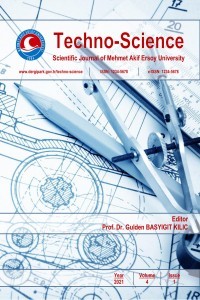Energy potential from gasification of agricultural residues in Burdur, Turkey
Energy potential from gasification of agricultural residues in Burdur, Turkey
Gasification is one of the major waste to energy technologies for renewable energy production. Agricultural residues have high potential to be used as significant source of renewable energy in Turkey. In this study, different gasification systems are compared to estimate the bioenergy potential of agricultural residues in Burdur province. Syngas produced from gasification process can be used as renewable fuel in internal combustion engines, turbines and boilers. Syngas energy potential of agricultural residues from air gasification of agricultural residues are evaluated in up-draft fixed bed, down-draft fixed bed and circulating fluidized bed systems. The results revealed that down-draft gasifier has shown the highest annual energy production potential of 402 MW in Burdur province.
Keywords:
Agricultural residues, Gasification, Renewable energy,
___
- [1]. Winley, T. M. L. (2018). The Paris warming targets: emissions requirements and sea level consequences. Climatic Change, vol. 147, no.1, p. 31-45, DOI: 10.1007/s10584-017-2119-5.
- [2]. Hegazy, A., Ghallab, A. O., Ashour, F. H. (2017). Integrated gasification combined cycle using Egyptian Maghara coal–rice straw feedstock. Waste Management and Research, vol. 35, no. 6, p. 656–68, DOI: 10.1177/0734242X17702728.
- [3]. Wielgosiński, G., Łechtańska, P., Namiecińska, O. (2017). Emission of some pollutants from biomass combustion in comparison to hard coal combustion. Journal of the Energy Institute, vol. 90, no. 5, p. 787-96, DOI: 10.1016/j.joei.2016.06.005.
- [4]. Vakais, A., Sotiropoulos, A., Moustakas, K., Malamis, D., Baratieri, M. (2016). Utilisation of biomass gasification by-products for onsite energy production. Waste Management & Research, vol. 34, no. 6, p. 564–71, DOI: 10.1177/0734242X16643178.
- [5]. Gohlke, O. (2009). Efficiency of energy recovery from municipal solid waste and the resultant effect on the greenhouse gas balance. Waste Management and Research, vol. 27, no. 9, p. 894- 906, DOI: 10.1177/0734242X09349857.
- [6]. Van De Kaa, G., Kamp, L., Rezaei, J. (2017). Selection of biomass thermochemical conversion technology in the Netherlands: A best worst method approach. Journal of Cleaner Production, vol. 166, no. 10, p. 32-39, DOI: 0.1016/j.jclepro.2017.07.052.
- [7]. Burra, K. G., Hussein, M. S., Amano, R. S., Gupta, A. K. (2016). Syngas evolutionary behavior during chicken manure pyrolysis and air gasification. Applied Energy, vol. 181, p. 408-415, DOI: 10.1016/j.apenergy.2016.08.095.
- [8]. Ismail, T. M., El-Salam, M. A., Monteiro, E., Rouboa, A. (2018). Fluid dynamics model on fluidized bed gasifier using agro-industrial biomass as fuel. Waste Management, vol. 73, p. 476-486, DOI: 10.1016/j.wasman.2017.06.018.
- [9]. Sansaniwal, S. K., Pal, K., Rosen, M. A., Tyagi, S. K. (2017). Recent advances in the development of biomass gasification technology: A comprehensive review. Renewable and Sustainable Energy Reviews, vol. 72, p. 363-84, DOI: 10.1016/j.rser.2017.01.038.
- [10]. Lopes, E. J., Queiroz, N.,, Yamamoto, C. I., Neto, P. R. C. (2018). Evaluating the emissions from the gasification processing of municipal solid waste followed by combustion. Waste Management, vol. 73, p. 504-510, DOI: 10.1016/j.wasman.2017.12.019.
- [11]. La Villetta, M., Costa, M., Massarotti, N. (2017). Modelling approaches to biomass gasification: A review with emphasis on the stoichiometric method. Renewable and Sustainable Energy Reviews, vol. 74, p. 71-88, DOI: 10.1016/j.rser.2017.02.027.
- [12]. Gungor, A. (2011). Modeling the effects of the operational parameters on H2 composition in a biomass fluidized bed gasifier. International Journal of Hydrogen Energy, vol. 36, no.11, p. 6592-600, DOI: doi.org/10.1016/j.ijhydene.2011.02.096.
- [13]. Gungor, A., Yildirim, U. (2013). Two dimensional numerical computation of a circulating fluidized bed biomass gasifier. Computers & Chemical Engineering, vol. 48, p.234-50, DOI: 10.1016/j.compchemeng.2012.09.012.
- [14]. Sutton, D., Kelleher, B., Ross, J. R. H. (2001). Review of literature on catalysts for biomass gasification. Fuel Process Technology, vol. 73, no. 3, p. 155–73, DOI: 10.1016/S0378-3820(01)00208-9.
- [15]. Saxena, R. C., Seal, D., Kumar, S., Goyal, H. B. (2008). Thermo-chemical routes for hydrogen rich gas from biomass: a review. Renewable Sustainable Energy Review, vol. 12, no. 7, p. 1909–27, DOI: 10.1016/j.rser.2007.03.005.
- [16]. Chhiti, Y., Kemiha, M. (2013). Thermal conversion of biomass, pyrolysis and gasification: a review. International Journal of Engineering Science, vol. 2, no. 3, p. 75–85.
- [17]. Hu, P., Hu, M., Shao, Z., Cheng, Y. (2018). Thermodynamic analysis of steam gasification of municipal solid waste. Energy Sources: Part A: Recovery, Utilization and Environmental Effects, vol. 40, no. 3, p. 623-629, DOI: 10.1016/J.ENG.2017.03.004.
- [18]. Couto, N., Rouba, A., Silva, V., Monteiro, E., Bouziane, K. (2013). Influence of the biomass gasification processes on the final composition of syngas. Energy Procedia, vol. 36, p.596-606, DOI: 10.1016/j.egypro.2013.07.068.
- [19]. Salami, N., Skála, Z. (2015). Use of the steam as gasifying agent in fluidized bed gasifier. Chemical and Biochemical Engineering Quarterly, vol. 29 no. 1, p. 13-18, DOI: 10.15255/CABEQ.2014.2120.
- [20]. Turkish Statistical Institute Database, from http://www.tuik.gov.tr/ (accessed November 19, 2018)
- Yayın Aralığı: Yılda 2 Sayı
- Başlangıç: 2018
- Yayıncı: Burdur Mehmet Akif Ersoy Üniversitesi
Sayıdaki Diğer Makaleler
Utilization of waste heat from exhaust gases of gasoline generator for water heating
Nicholas MUSA, James OKEGBİLE, Adeola OWOJAİYE
Energy potential from gasification of agricultural residues in Burdur, Turkey
Zuhal AKYÜREK, Afşin GÜNGÖR, Ali Özhan AKYÜZ
